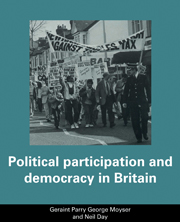Book contents
- Frontmatter
- Contents
- List of figures
- List of charts and maps
- List of tables
- Preface
- Part I Theories and methods
- Part II Patterns and pathways
- Part III Issues and actions
- Part IV The local process
- 14 The local political scene
- 15 Local participation
- 16 Local elites, activists and agendas
- 17 Participation and the making of the local agendas
- 18 The quality of local participation
- Part V Conclusions
- Appendix A Survey methods
- Appendix B Measuring elite-citizen concurrence
- Appendix C The National Questionnaire
- Endnotes
- Bibliography
- Index
15 - Local participation
Published online by Cambridge University Press: 03 May 2011
- Frontmatter
- Contents
- List of figures
- List of charts and maps
- List of tables
- Preface
- Part I Theories and methods
- Part II Patterns and pathways
- Part III Issues and actions
- Part IV The local process
- 14 The local political scene
- 15 Local participation
- 16 Local elites, activists and agendas
- 17 Participation and the making of the local agendas
- 18 The quality of local participation
- Part V Conclusions
- Appendix A Survey methods
- Appendix B Measuring elite-citizen concurrence
- Appendix C The National Questionnaire
- Endnotes
- Bibliography
- Index
Summary
The extent to which people are led to take political action over local matters has been made evident repeatedly in the preceding chapters. Here we wish to explore this further by examining how far patterns of participation vary across the six localities or whether there is a common process at work. The major social and economic characteristics of the localities were outlined in the previous chapter. The question now to be addressed is how far these social characteristics produce striking variations in the levels and modes of participation.
One school of thought in political science argues that politics is nowadays essentially nationalised, not to say internationalised. This would be particularly so in a relatively small country such as Britain. On this view, people are mobilised to political action on the basis of national issues identified by national parties and publicised in the nationwide press, radio and television media. People have interests which arise primarily from their social location, whether as members of a social class or as workers in a particular production sector, or as persons with a particular profile of public or private consumption (see chapter 6 above). It would not, however, follow from this view that political behaviour was entirely uniform across the nation. Rather, differences in behaviour in different localities or regions would be explicable according to the variations in the preponderance of a particular social class or of a certain type of economic production in the area.
- Type
- Chapter
- Information
- Political Participation and Democracy in Britain , pp. 316 - 347Publisher: Cambridge University PressPrint publication year: 1992

